- Home
- Joy Dettman
Jacaranda Blue Page 7
Jacaranda Blue Read online
Page 7
Her father still spoke in miles, refused to acknowledge the existence of kilometres; thus she spoke in miles, had for half of a lifetime been converting kilometres to miles for him, doing the arithmetic in her head.
‘How many miles is 544 kilometres, Daughter?’ he’d ask, and she’d reply, ‘325, or near enough, Father.’
At what age did I learn the trick that appeased his desire to ignore change? she thought, but she shook her head. She couldn’t remember. At what age did I learn the trick of putting each day behind me? She couldn’t remember that either. ‘Poor Father,’ she said. ‘How did it happen? How did I allow myself to get to this day? Why didn’t I run for the axe that day? Why didn’t I scream?’
Still looking at the signposts, she selected reverse, then she turned the car around. ‘Twenty miles to Maidenville. Twenty miles on empty. We are both running on empty, little white car. Will we both make it back?’ she asked, and she looked at the clock on the dashboard. ‘Miss Moreland will be thinking I’ve forgotten about her.’
The Grand Old Dame
There was never a time when she had not known Miss Moreland, former headmistress at the high school, former Sunday-school teacher. A frequent visitor to the house when Stella was a child, she had been supportive, coming when she was called; she could always put things right. Once she’d taken up her scissors to level a child’s hair, to put things right, and her school-teacher hands had been gentle.
Like Stella, Miss Moreland had been tied for years to an invalid parent. They had that in common, and perhaps it helped to forge this strange friendship. But Miss Moreland celebrated her mother’s death by retiring from her position at the high school, then setting off to see the world on her mother’s hoarded money. Only when she began to run short of cash did she curtail her travels, sell the old house, and buy a modern unit at the retirement village behind the hospital.
Her stance upright and proud, her thick hair rinsed a champagne blond, a touch of make-up, carefully applied, Miss Moreland refused to be considered as one of the elderly. Few in town had known the grand old dame’s age until she broke her arm, when her date of birth was exposed to hospital staff. Within days the news had filtered across the town to become the main talking point at tea parties.
Calculations were made by the town busybodies. ‘She must have been in her sixties when she’d taught me in form four. I was sixteen in form four. She must have been over seventy when she retired from the school, and well into her eighties when she went on the cruise to New Zealand. She couldn’t have been far from ninety when she went to India. My word, she could have died there amongst the heathens.’
Miss Moreland had no fear of gossip, age, or gods, be they Anglican or heathen. Having travelled to the far end of her life, she looked to her ultimate death with great interest, as many might look towards a grand tour of Europe. Death was one of the few places she hadn’t been; still, if her plane was running a little late, she had no complaints. Her bags were packed and in order, and when her flight from Maidenville came in, she would freshen up her lipstick and fly away with a wave of her hand.
The old rocking chair on her front porch was her one concession to age. She was seated there now, rocking, watching for her late visitor.
‘You’re late, my girl. I thought you’d absconded with the guild’s funds,’ she called as the car drew to a halt in her drive.
As with Bonny, being around Miss Moreland always made Stella aware of her own lack of colour. Today her old friend looked a young and vigorous seventy-five in her grey slacks, and shirt of red and grey.
‘I went for a long drive, my dear. It has been so long since I’ve managed to wheedle the keys away from Father, I took the opportunity to . . . to just drive. I forgot the time.’
‘Forgot to put your hair up too.’ Miss Moreland stood and pulled at a corkscrew curl that the wind had found free to tangle. ‘You look like an underfed mouse with dreadlocks. If Arnold Parsons got a look at you today, he’d have good reason to call you Miss Mousy.’
Stella ran her fingers through her hair, gathering it. Habit twisted it into the familiar knot, then she remembered the scratch on her neck. She let the hair fall back. Her hand straying to the scratch, she drew a curl forward.
‘It’s Mousy Two. He began it way back when I was three or four. I tell him frequently that he is giving me a complex, but he tells me it’s a compliment.’
‘Some compliment.’
‘It’s from a tale of two mice swimming in circles in a vat of cream. He told it to me long, long ago, and I often wish I could remember it. I used to buy old nursery rhyme books as a child, hoping to come across it, but I never did.’ She removed her sunglasses. ‘You look well as usual. I do like your shirt.’
‘I got it at the department store yesterday. It cost enough – and don’t you go trying to turn the subject on me. Your father said you weren’t yourself this morning, and for the first time in his life he may be right. Have you looked in a mirror lately?’ She led her guest indoors where she propped her before a mirror that took up most of her small hall.
Stella peered at the face of the stranger. Her eyes were deeply set and bloodshot. The half-circles beneath them stood out like bruises. ‘I didn’t sleep well.’
‘More than a sleepless night caused that, girl. A good howl caused that. And what’s with that fringe? Your hair never took well to a fringe.’
‘It’s – it was overdue for a change, Miss Moreland.’
The old lady’s eyes didn’t believe her. ‘Anything you want to tell me, girl? I’m a good listener.’
Stella shook her head. She stepped back, took a brush from her handbag, flattening her fringe, tidying the wayward curls. She managed a lame smile as she dropped the brush back in her bag and began delving for the knitting she always kept by her side. Unable to look the old woman in the eye, she drew the knitting from the bag and began winding the wool.
Miss Moreland stood, hands on hips, feet planted wide, studying her. ‘Your father said you’ve been getting obscene phone calls. Is that what’s troubling you?’
‘No. Truly, I’m fine.’ Or I will be soon, she thought. So my virginity has been sacrificed upon the altar of youthful greed, but I have grown accustomed to sacrifice. Tomorrow will be easier, and the day after tomorrow easier than the one before. I have to go on.
The old lady was speaking. Stella hadn’t heard her. ‘ – haven’t had a decent one for twenty years. My own fault. I always took the wind out of their sails. You know, I used to get a real kick out of those phone calls. Might have even shocked a few perverts into giving it up for life.’ Stella smiled, her mind back on track as she was ushered into the open-plan lounge/dining/kitchenette.
‘Never let them know that they’re shocking you. That’s the trick. Give them back as good as they give you,’ Miss Moreland added.
‘I haven’t . . . Father had a few calls this morning. A bit of heavy breathing, I believe. I’m sure it’s nothing,’ she said.
Her Saturday afternoons in this modern little unit were never a duty. Her mind never wandered, not in this place. Conversation never lagged. Miss Moreland was a friend, a dear friend, and one with whom she could relax, be herself, speak her mind and shame the devil – or God. As she watched the older woman preparing tea, buttering scones, for one fragment of an instant she thought of telling her the truth, of opening her mouth and sharing the shame. Freeing it to words may make it less, she thought.
Shame stifled her beginning. She felt her heart begin its mad race and her face begin to burn at the thought of exposing herself to this town. And exposed she would be. She looked at the telephone hanging beside the sink. Miss Moreland would be on the phone to Sergeant Johnson in the time it took her visitor to form three words. What was the use? It is over. In a week . . . in less than a week, I will know if there are to be any further complications. But by then I will be in Sydney. I will put it behind me today. What is done cannot be undone. Time will heal.
Doesn’t time always he
al? When Ron and Marilyn announced their surprise wedding, I got over it, even though I thought Ron still loved me, that he was filling in time with Marilyn, waiting for me. And when I gave up singing with Steve’s band, didn’t the disappointment fade after time? Of course it did. I will be fine once I am away from here, but until I go I have to keep behaving in the same way, keep my chin up, and smile. Give no-one reason to question me, and learn to deal with the problems as they arise – as I have always done.
Silences were rare between these two, but today a silence kept growing, and though Stella tried to do what her mind bid her do, her thoughts continued their wandering.
Miss Moreland was no fool. Questions rarely brought the answers desired, but if she waited, watched and listened, answers often had a way of coming unbidden. When they didn’t come this day, she tried her second ploy. She asked an innocent question. ‘Did you get to watch the golf yesterday?’
‘No.’ Stella’s heart thumped in her throat, and her mind returned to the shed and to the smell of the earth, and her blood on the earth, and the stink of his sex. She could still smell it in her hair. The wind had not blown it clean. She had washed it and washed it last night, had used the last of the shampoo on it; still it smelt of him. Her hand rose to her hair. She drew a strand forward, smelt it. Have to cut it off, she thought. Go to the hairdressers and get it all cut off.
‘What’s wrong with your hair today?’
‘I . . . I washed it last night and rather foolishly went to bed with it wet. It dried wild. I’m . . . I’m thinking of getting it cut like Bonny’s.’
‘What did you get up to yesterday?’
‘Nothing.’ Her voice was defensive, her heartbeat erratic as guilt rose like a wave in her brain. Guilt planted by God, and her mother, to cower the innocent. Blood rushed her cheeks, her brow. Her hands began their burning.
‘Did you go to the funeral?’
‘No. Father went to the funeral.’
‘Wouldn’t be much of a show without Punch, would it? I hear he’s got another one on Monday.’
‘Monday. Yes. Yes. A lot of relatives are from out of town. The two boys.’
Again the silence.
‘Did you see Bonny yesterday?’
‘Yes.’ Stella’s chin lifted. ‘We were speaking about . . . she said she’d potted out a lot of junipers, and we thought we might have a separate gardening stall this year. There is so much in my own garden. I’ll have to get into the shed and – ’
Her mind went away to the shed, and the rape and the silence grew long again as she sat, shoulders hunched, counting stitches with her fingers, recounting stitches while the old woman stared at her bowed head.
‘Stella Templeton. What in God’s name is the matter with you today?’
‘I . . . I didn’t sleep well.’
‘We’ve been through all that. Spit it out. I know there’s something troubling you and don’t deny it. I’ve known you too long, girl.’
‘I’m fine. Really.’
Miss Moreland rose, walked to her cupboard, selected a bottle then poured a portion into a glass. She added water from the tap. ‘Here then, get this into you.’
‘What – ?’ Stella took the glass.
‘Down the hatch with it and don’t you give me any arguments. You’re as white as a sheet and if you’re not going to tell me why, then drink this down then go home to bed. I don’t know what your father was thinking of, allowing you to come out today.’
‘I’m quite well, really.’
‘Pseudo martyrs are two-a-penny in this town. And I can assure you that the town and I will survive without you for a few days. You go home to bed, and if you don’t feel any better in the morning, then give Parsons a call, and have a check-up.’
Stella sat handling the glass, peering at its contents, thinking of Doctor Parsons and if perhaps he would be the one to tell. He would understand, and he could keep a secret – but would he keep this secret? And what could be gained – unless she pressed charges against the youth? And what would Marilyn do if she did? And Ron? What would he think of her?
‘Drink it. Get it into you, girl.’
‘What is it?’
‘It’s brandy and water, and it’s gotten me through every emergency that’s arisen in my life in the past seventy-odd years, and God willing it will keep me going long enough to get my telegram from Queen Lizzie. Now down the hatch with it and go home. I will brook no argument today, girl.’
Stella emptied the glass, then she left.
The minister was waiting for his car at the front gate. She stopped the vehicle, climbed out, and handed him the keys.
‘Did you buy milk, Daughter?’
‘Milk?’
‘I asked Miss Moreland to remind you.’
‘No. No. She didn’t remind me. The petrol is . . . is very low.’
He watched her back as she walked down the drive to the house, then with a shake of his shaggy head, he climbed into the car, roared the motor and drove away.
The phone began ringing as Stella entered the kitchen. She heard it, but her mind refused to make the connection. It continued its high-pitched ring, jarring against her eardrums until habit saw her walk to it, reach out and silence it, place the phone to her ear. ‘Stella Templeton speaking,’ she said.
‘Did you like it?’ he said. ‘I did.’
Her tongue still burned with the taste of brandy, and in her stomach, the brandy tried to rise. She gagged, dropped the phone.
‘Glad you’re keeping your mouth shut, Aunty Stell.’ He waited for her reply and when there was none, added. ‘I might come and visit you again one day.’
He didn’t know he was speaking to the panelled wall.
The Tour
Martin wandered in later, a carton of milk in his hand. Minutes passed before he tracked the muffled beeping to the hall, and to the dangling telephone. He shrugged, placed it on the cradle. So there had been another call. Juvenile delinquents, with nothing better to do than to play pranks on busy people.
‘Daughter?’ he called at the stairs.
There was no answer. He walked to her door, stood a moment, knocked three times then coughed. The door wouldn’t open. She had obviously placed a chair behind it. He knocked again. ‘Daughter. Are you all right?’
‘Go away, Father. Just leave me alone, please.’
It was a reply that had plagued the years of his wedded life, and one he hadn’t missed. Always more confident preaching to the masses than communicating with individuals, he stood shaking his head, his mind forming questions he might ask.
It appears that something has seriously upset you, Daughter, he might say, or perhaps, What is it that has caused this upset, Daughter? Let us talk it out, and see if we can find a solution. No, he decided. Least said, sooner mended. She had asked to be left alone, so he would respect her wishes. He stepped back.
Her mother had been a highly strung woman, who had not enjoyed the duties of a wife, nor had she accepted the responsibilities of motherhood as he might have hoped. Was his daughter now going down the same path of melancholia? Anger for breakfast, silence for lunch, recriminations for tea. Martin shuddered. Having been through it once, he had no desire for a repeat performance.
Storms pass, he thought. Stella has always been a sensible girl. She will weather this storm far better alone. She’s had one of those damnable phone calls. Never a worldly girl, it has upset her, and rightly so. That and the virus. Yes. He nodded, and took three more steps towards the stairs.
There was much on his mind today. The telephone had not stopped its ringing while Stella was out. Barely had he placed it down when the damnable thing would call him from his work again. But he’d been pleased to take the final call. It was from one of the few men he had, in his life, named friend.
Martin and Patrick O’Sullivan, a Catholic priest, had weathered the war together in Africa and France. They had travelled home on the same boat when the war was won, and they still kept in touch. Patrick had telephoned
this afternoon from Sydney. He’d spoken for twenty minutes, attempting to persuade Martin to fill a gap on a planned tour of their former battle-grounds. Patrick had the persuasive tongue of the Irish.
It was a fully guided tour, he’d said. No luggage to handle, no stress. Quality hotels all the way. They would be picked up each morning at the hotel door, and dropped off there each night. Comfortable airconditioned buses all the way.
And France. To see Paris again. Martin loved the French – loved anything French. Hadn’t he intended returning to France after the war, and to the young French lass who had initiated him into a more giving love than he had known with Angel?
And London. Wonderful London. The tour would take in Churchill’s bunker, left as it was on the day the war ended. Untouched. A small segment of trapped time – and trapped from a time Martin had understood. He was out of touch with the nineties.
Africa? Well, he could take that or leave it, but it certainly would be an experience. The tour was also taking in Germany – only the edge, but quite enough.
‘And a weekend of sightseeing in Switzerland, beautiful Switzerland. It is certainly tempting,’ he said to the stair rail, neither up nor down. His thoughts silenced, he listened again. At least there was no uncontrolled weeping coming from his daughter’s room. His wife had frequently shaken the very foundations of the house with the intensity of her weeping.
What age is Stella now? Forty – . He did some mental additions. Angel had been forty-seven when Stella was born. ‘Forty-four last January,’ he said.
Middle age could be a difficult time for a childless woman. I could not leave her alone in this state, of course. Still, it may be a temporary upset, and probably is. She may be fine in the morning. It would do no harm to call the tour organiser, sound him out. No harm at all.
The tour, then only an idea, had been suggested to Martin in October. He’d given the embryonic plan careful consideration, but when it came time to pay his deposit, he’d decided against it. After all, at his age, anything could happen in six months.

 The Hope Flower
The Hope Flower Trails in the Dust
Trails in the Dust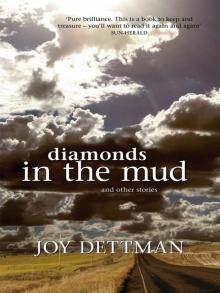 Diamonds in the Mud and Other Stories
Diamonds in the Mud and Other Stories Moth to the Flame
Moth to the Flame The Tying of Threads
The Tying of Threads Wind in the Wires
Wind in the Wires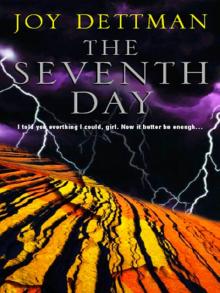 The Seventh Day
The Seventh Day Thorn on the Rose
Thorn on the Rose Jacaranda Blue
Jacaranda Blue Mallawindy
Mallawindy Ripples on a Pond
Ripples on a Pond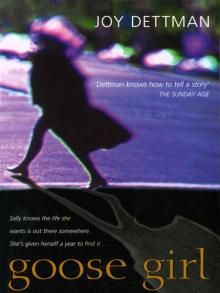 Goose Girl
Goose Girl The Silent Inheritance
The Silent Inheritance Henry’s Daughter
Henry’s Daughter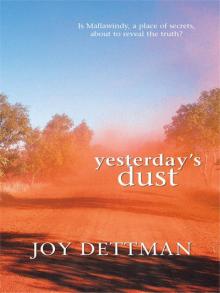 Yesterday's Dust
Yesterday's Dust Pearl in a Cage
Pearl in a Cage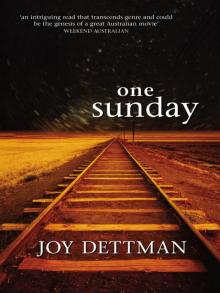 One Sunday
One Sunday